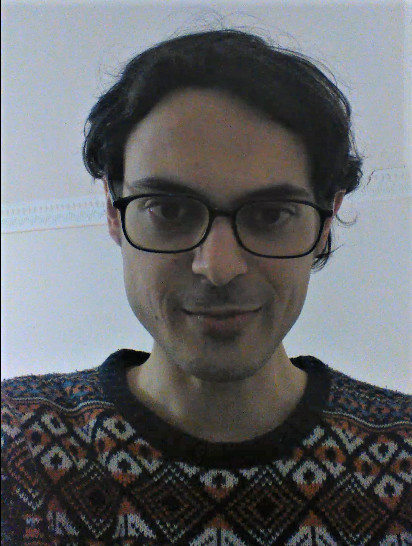Dillon Struwig (ディロン ストルウィグ) 講師
学歴 Academic background |
||
|---|---|---|
|
BA, University of the Western Cape (English and Ethics) MSt, University of Oxford (English Language and Literature, 1800–1914) PhD, University of York (English) |
 |
|
専門分野 Academic interests
- My research mostly covers different aspects of the philosophy and intellectual history of the British Romantic period, with a focus on the work of Samuel Taylor Coleridge. In particular, some of my recent publications and presentations examine Coleridge’s moral philosophy, his theory of logic and philosophy of mind, and his views on the nature of space, time, and matter. I also have broader interests in the fields of Buddhist philosophy, ethical theory, environmental history and philosophy, and British literature and culture from the eighteenth century to the present.
担当科目 Courses provided at Department of English Studies
-
English Composition B
This course focuses on developing the skills required to plan and write research essays of 1,500–3,000+ words with a coherent and well-supported argument. The areas covered will initially include selecting and refining an essay topic, identifying and critically evaluating relevant sources, and drafting an outline based on a working thesis statement. Subsequent classes will explore effective strategies that can be used during the essay drafting and revision process, with careful attention to explaining how to work from an outline and integrate sources while developing an argument. Throughout the course, there will be an emphasis on learning how to express one’s ideas clearly and confidently in written form.Cultures of the English-Speaking World
This course introduces students to the cultures and societies of the English-speaking world from a historical perspective. While the principal focus is on contemporary British life and culture, each topic will be explored with reference to the relevant historical background and context. The main themes of the course will include culture and national identity, multiculturalism, historical memory, and contemporary issues related to class, gender, and race in the United Kingdom. These themes will be examined using a wide range of materials, including newspaper and magazine articles, academic essays and opinion pieces, film and television clips, and different types of fictional texts.British Philosophy and Political Theory
This course seeks to introduce students to some of the major thinkers and key intellectual trends in British philosophy and political theory from the early modern period up to the present. It examines the historical contexts in which different political and philosophical ideas developed in Britain, with a focus on the underlying connections between economic, moral, and social concerns that are evident in the articulations of such ideas in the main strands of British political thought. Overall, this course seeks to provide students with a broad overview of the ways in which British philosophy and political theory developed in response to specific social, historical, and economic forces, in addition to being shaped by particular religious and intellectual trends.Special Topics in British/European Studies: British Women Philosophers, 17th century to Present
This course introduces students to some of the major British women philosophers from the 17th century to the present. It seeks to show that while many of these thinkers were actively engaged in discussing gender equality and related social issues, most of their work focused on addressing the main philosophical concerns of their respective historical periods, especially in fields such as metaphysics, moral philosophy, and epistemology.
The first half of the course examines the work of women philosophers from the mid-1600s to the early 1800s, focusing on their contributions to early modern debates on metaphysics, scientific knowledge, and the philosophy of mind. The second half of the course explores the ideas of those women philosophers whose work had a significant impact on the development of analytic philosophy (currently the dominant tradition in English-language philosophy worldwide) from the 1930s to the 2000s, especially in ethics and metaphysics. The course also considers the social and historical contexts in which these different thinkers lived to indicate the challenges they faced as women working in philosophy. However, the main focus is on evaluating their key ideas and arguments and explaining the philosophical and historical significance of their work.
Reading Skills B: Understanding and Engaging with Philosophical Texts
This course aims to provide students with opportunities to further develop, practice, and reflect on the skills required for reading and critically engaging with philosophical texts. The main goal is to enable students to develop the foundations for exploring their own philosophical interests independently. The course also focuses on different methods for understanding, evaluating, and responding to arguments in a wide range of philosophical disciplines (epistemology, philosophy of mind, philosophy of science, philosophy of religion, and other related fields).
This course is suitable for both (1) students with prior knowledge of philosophy who would like to gain more experience in reading philosophical texts in English, and (2) students with limited (or even zero) background knowledge in philosophy who would like to learn more about some of the major disciplines and approaches in this academic field. It is not an introductory course to philosophy, but rather a course that explores how to read philosophical texts productively, with a focus on understanding how philosophical arguments are formulated, evaluated, and criticized in various contexts (e.g., claims about scientific knowledge, human minds, or religious belief).
Skills for Study Abroad 1A, 1B, 2A, 2B
This course introduces students to some of the skills, knowledge, and strategies that aid in preparing for, adjusting to, and making the most of the experience of studying abroad. The class will use active learning methods, including class debates, reaction papers, and individual or group presentations, to provide opportunities to practice and improve those critical thinking and discussion abilities valuable for international students based at foreign universities (with a focus on the integrated development of writing, reading, speaking, and listening skills).
The material in each quarter covers the following topics: (1A/1Q) intercultural learning and its relevance in study abroad contexts; (1B/2Q) practical skills, self-management methods, and study techniques relevant to study abroad contexts; (2A/3Q) intercultural communication and its relevance in study abroad contexts; and (2B/4Q) intercultural competence and its relevance in study abroad contexts.
主な著書、その他 Publications, Others
主な著書/Publications
“A ‘critical inquisition into the constitution of the intellectual faculties’: Kantian transcendental analysis and transcendental reflection in S.T. Coleridge’s Logic”, Intellectual History Review, 2022. DOI: 10.1080/17496977.2021.2017704
“Powers and Plantules: Coleridge’s Logic on the Nature of the Faculties”, Journal of Romanticism 2, 2017, 57–81.
“Coleridge’s Two-Level Theory of Metaphysical Knowledge and the Order of the Mental Powers in the Logic”, Ch. 11 in Coleridge and Contemplation, ed. Peter Cheyne, with a foreword by Mary Warnock, Oxford University Press, 2017, 193–210.
“‘Schelling puzzles me for ever’: Freedom, Evil, and Remorse in Coleridge’s Critical Commentary on the Freedom Essay”, The Coleridge Bulletin, NS 50, Winter 2017, 69–83.
その他/Others
Recent Academic Presentations
“An ‘Alphabet of the Philosophy of physical Dynamics’: Coleridge’s Theory of Matter and Kant’s Metaphysical Foundations of Natural Science”, invited contribution for Living Ideas: Dynamic Philosophies of Life and Matter, 1650–1850 research project (https://livingideasproject.wordpress.com) led by Peter Cheyne (Shimane); presentation at Tokyo conference scheduled for September 2020 (cancelled due to COVID-19; online version in preparation).
“The Concept of Nature in British Romanticism and Beyond: Changing Ideas in Art, Literature, and Philosophy”, invited lecture presented at Kansai University, Faculty of Letters, 13 July 2017.
“Contemplating the Forms of Cognition: Coleridge’s Two-Level Theory of the A Priori”, presented at Coleridge and Contemplation Workshop: Stretching to Hear, University of Cambridge, 10–11 August 2015.
“Geometrical Construction from Plotinus to Kant: Contemplative Acts and Intuitive Imagination in Coleridge’s Theory of Mathematical Synthesis”, Kyoto Conference on Coleridge and Contemplation, Kyoto Notre Dame University, 27–29 March, 2015.
“‘Schelling puzzles me for ever’: Coleridge’s Commentary on the Freedom Essay”, presented at Evil, Freedom, and Time: A Conference on Schelling’s Freedom Essay and Ages of the World, University of Warwick, 30 May 2014.


















